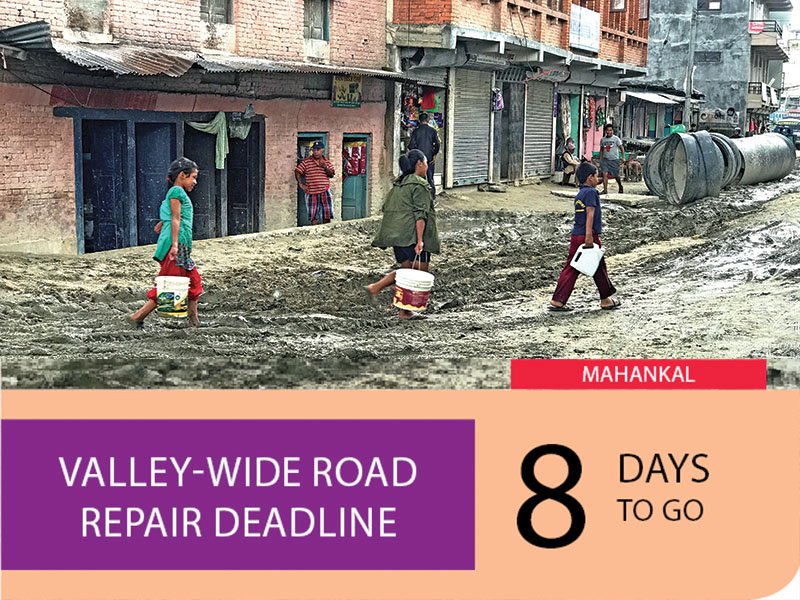‘Water supply, sewerage systems need restructuring’
Government officials concluded that the water supply lines and sewerage system in Kathmandu Valley must be restructured for a durable solution to road problems.
After monitoring the pit-filling work in Kathmandu, Secretary at the Office of the Prime Minister and Council of Ministers Chandra Ghimire told THT the sewerage system in the Valley was totally mismanaged and the risk of old sewer pipes bursting anywhere at any time was all too real.
Ghimire and Secretary at Ministry of Water Supply and Sanitation Bhim Prasad Upadhyaya visited various sites last night to monitor the progress of road repairs in Kathmandu.
Prime Minister Sher Bahadur Deuba had, on July 16, instructed the authorities concerned to fix the potholes and pits in Kathmandu within 15 days after Binita Phuyal, a student, drowned in a rain filled pit at Nepaltar and another schoolgirl Satya Sapkota fell into a pit at Samakhushi. Luckily she was rescued.
Ghimire said the authorities did not have proper maps of either the drinking water supply lines or sewerage system in the Valley. “I found two disconnected drainage pipes in Chabahil. This meant waste leakage could damage the road,” he said, adding, “No one knows the source and end-point of the sewerage pipes.” He said such lapses in the sewerage system had caused inundation, pits on the roads and loss of blacktopping. “In some places we saw drainage pipe placed above drinking water pipes. This can cause holes or cracks in the drinking water pipes,” Ghimire said.
He said it was impossible to blacktop all the problematic areas as the sewerage management authority would have to restructure the entire system. “Once Kathmandu residents get water from the Melamchi Water Supply Project, the volume of waste in drainage pipes will increase. This could cause cracks or holes in the joints of drinking water pipes,” he added.
He said he had instructed the authorities concerned to work on a war-footing to fix the potholes and pits or else they might not be able to do the job within the 15 days’ deadline.
Ghimire and Upadhyaya started their monitoring from Gaushala and went to Chabahil, Chhuchhepati, Mahankal, Maharajgunj and Jamal. Ghimire also said most of the filled pits on roads would not be black-topped immediately because hydraulic testing of drinking water pipes laid by the Melamchi Water Supply Project was yet to be conducted.
Division-1 Office of the Department of Roads continued to fix the roads today as well. According to Division-1 Chief Mukunda Adhikari, the pits were being filled with standard gravel to ease vehicular movement on those roads.
He, however, said his office could not repair the 13-km road stretch along the Dhobikhola Corridor Development Project as drainage pipes were still being laid there.






